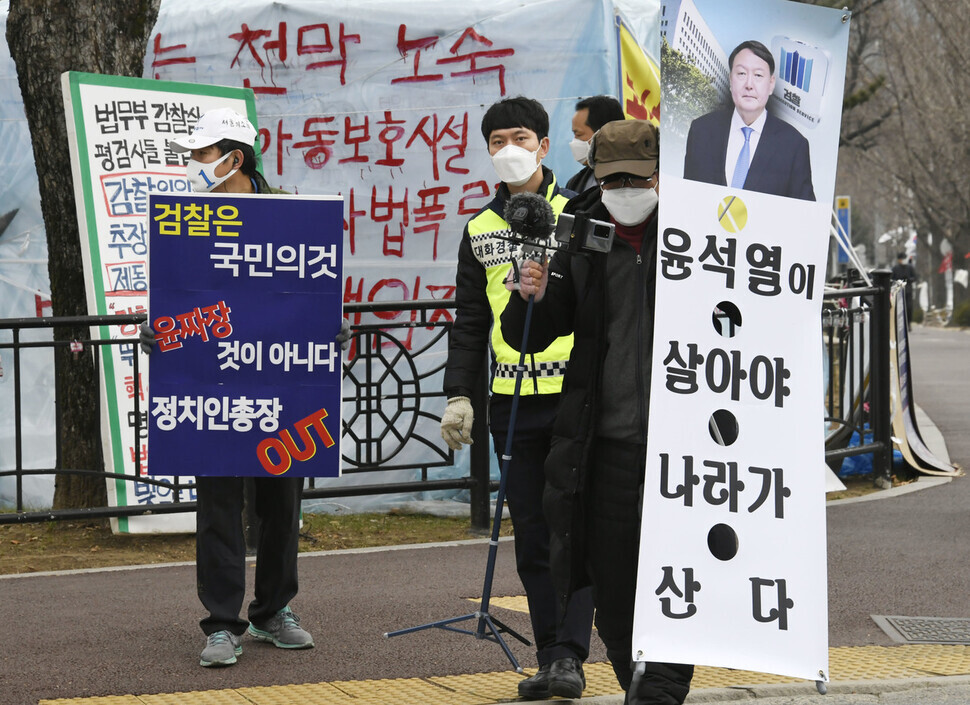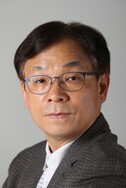hankyoreh
Links to other country sites 다른 나라 사이트 링크
[Column] Whose side is the Hankyoreh on?

Mr. Lee, a few days ago you asked me whose side the Hankyoreh is on. You were referring to the dispute between Justice Minister Choo Mi-ae and Prosecutor General Yoon Seok-youl, which has become an all-out brawl.
I also got the impression you were pushing the Hankyoreh to firmly adopt one of two competing narratives about everything that has been happening: whether it’s an attempt to reform the prosecution service or to tame it. Admittedly, a lawmaker from the ruling party called on reporters from the Hankyoreh and other media outlets to preemptively resign from the judicial press pool, which is suspected of being soft on the prosecutors, in order to prove their commitment to prosecutorial reform.
The Hankyoreh’s editorial stance during the disciplinary proceedings against Yoon must have seemed ambiguous to you. Straight news stories, editorials, columns, and editorial cartoons have made clear that opinions at the Hankyoreh run the gamut.
Some pieces have criticized Choo’s missteps, which have actually served to obstruct prosecutorial reform, while others have denounced Yoon’s overt mistakes that reveal his political motivations. Sometimes pieces on the same page have offered conflicting perspectives and prescriptions, such as the column titled “Junior prosecutors in 2003 and 2020” and the editorial titled “Disciplinary panel must avoid any procedural flaws in proceedings against Yoon” in the Dec. 3 issue of the newspaper.
I grant you that it’s good for a newspaper to take a clear stance on pressing matters. Readers aren’t likely to trust a paper that’s wishy-washy on issues or sits on the sidelines.
But as you’re no doubt aware, that kind of consistency and clarity aren’t always possible. Both Choo and Yoon have their own justifications and deficiencies, as well as incidents from past and present to back up their respective arguments. Once the dust from their brawl has settled, the big picture will become a little clearer, but for now, it’s not easy to reach a conclusion.
Daniel Okrent, who became the first public editor of the New York Times in 2003, offered the following response to an angry reader in the feedback section: columnists are free to write whatever they want, and readers are free to disagree with them. I take that to mean that there’s bound to be a range of opinion inside a newspaper about complex issues.
But it’s a newspaper’s job to report the facts and make judgments about issues as complex as prosecutorial reform on a daily basis. So, what’s the right approach for a paper to take?
I’ve thought about a number of options. First, there’s the “unmoored” approach. When a newspaper suspends judgment on perplexing issues, its articles will bob around aimlessly, like a boat with the engine turned off.
Second is the “forward march” approach, in which a newspaper is overtly biased toward some political cause. This does produce a consistent narrative, but it’s toxic for society as a whole.
Third is the “lodestar” approach. This means clearly defining values that provide a basis for weighing gravity, assigning priority, and judging right and wrong. The analogy here is to a traveler at night who sets their course by the North Star, while also keeping an eye on forks in the path and obstacles underfoot. In this approach, consistency of method provides the impetus for moving forward.
A newspaper that takes the third approach need not lurch from one side to the other for fear of being indecisive.
You would agree, I’m sure, that the goal of prosecutorial reform is to strengthen democracy by making the prosecution service fair and neutral. In light of that goal, and those values, Yoon’s political behavior, his targeted investigations, and his sheltering of other prosecutors deserves to be criticized as resistance against such reform. By the same token, Choo’s undermining of procedural legitimacy, which has nothing to do with democratic control of the prosecution service, should be criticized just as severely.
The same goes for the Corruption Investigation Office for High-Ranking Officials (CIO). The Hankyoreh regards the CIO’s establishment as an important milestone in prosecutorial reform and argued in editorials that the legislation in question needed to be revised to eliminate the opposition party’s veto power.
But we shouldn’t simply brush aside concerns that the CIO, which reports directly to the president, could upset the separation of powers, a prerequisite for democracy, by bringing the prosecutors and the rest of the judicial branch under the control of the executive branch. That’s especially true since the opposition party’s check on the CIO has been eliminated.
Needless to say, the Hankyoreh should be vigilant in its scrutiny and vigorous in its criticism to ensure that democratic systems and practices take root at the country’s law enforcement agencies, including the prosecution service and the CIO.
Differences of opinion are sure to be seen in Hankyoreh reporting in the future. But I hope that those differences will represent not internal chaos but rather the process of determining right and wrong based on the newspaper’s values. And that will be my response the next time you ask me which side I’m on.

By Lee Bong-hyun, doctor of journalism of mass communication
Please direct comments or questions to [english@hani.co.kr]
Editorial・opinion
![[Column] Life on our Trisolaris [Column] Life on our Trisolaris](https://flexible.img.hani.co.kr/flexible/normal/500/300/imgdb/original/2024/0505/4817148682278544.jpg) [Column] Life on our Trisolaris
[Column] Life on our Trisolaris![[Editorial] Penalties for airing allegations against Korea’s first lady endanger free press [Editorial] Penalties for airing allegations against Korea’s first lady endanger free press](https://flexible.img.hani.co.kr/flexible/normal/500/300/imgdb/original/2024/0502/1817146398095106.jpg) [Editorial] Penalties for airing allegations against Korea’s first lady endanger free press
[Editorial] Penalties for airing allegations against Korea’s first lady endanger free press- [Editorial] Yoon must halt procurement of SM-3 interceptor missiles
- [Guest essay] Maybe Korea’s rapid population decline is an opportunity, not a crisis
- [Column] Can Yoon steer diplomacy with Russia, China back on track?
- [Column] Season 2 of special prosecutor probe may be coming to Korea soon
- [Column] Park Geun-hye déjà vu in Yoon Suk-yeol
- [Editorial] New weight of N. Korea’s nuclear threats makes dialogue all the more urgent
- [Guest essay] The real reason Korea’s new right wants to dub Rhee a founding father
- [Column] ‘Choson’: Is it time we start referring to N. Korea in its own terms?
Most viewed articles
- 1New sex-ed guidelines forbid teaching about homosexuality
- 260% of young Koreans see no need to have kids after marriage
- 3Presidential office warns of veto in response to opposition passing special counsel probe act
- 4[Column] Life on our Trisolaris
- 5Months and months of overdue wages are pushing migrant workers in Korea into debt
- 6OECD upgrades Korea’s growth forecast from 2.2% to 2.6%
- 7S. Korea discusses participation in defense development with AUKUS alliance
- 8[Editorial] Penalties for airing allegations against Korea’s first lady endanger free press
- 9Opposition calling for thorough investigation into Pres. Park’s unelected power broker
- 10Ruling and opposition parties agree to special prosecutor for Pres. Park/Choi Sun-sil scandal